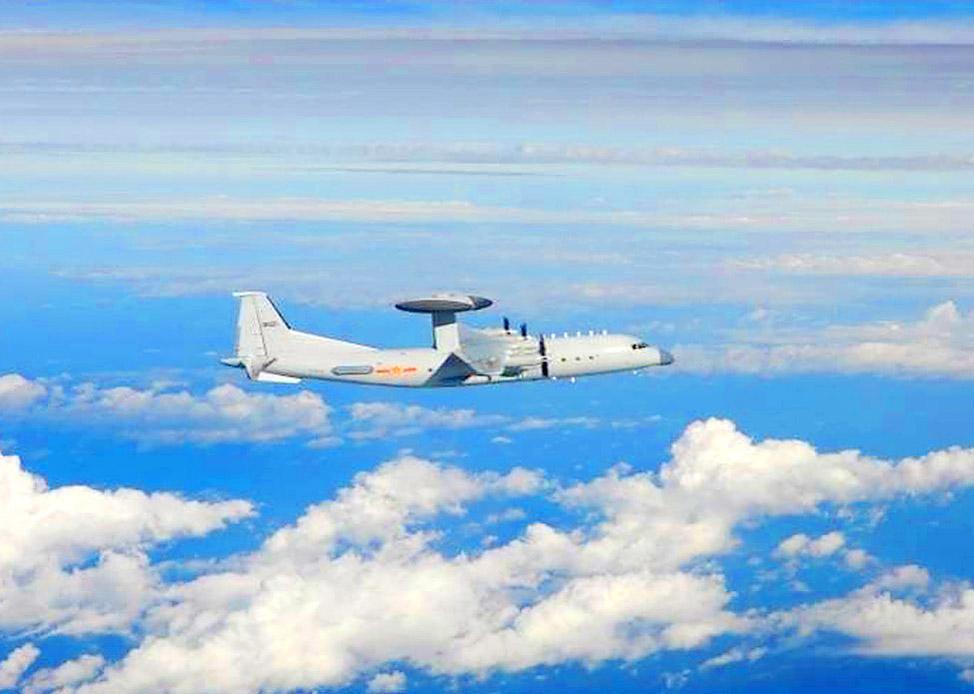The Ministry of National Defense yesterday said that it is combating Chinese Communist Party (CCP) cognitive warfare efforts against Taiwan.
The ministry said it has submitted guidelines to the Legislative Yuan to define cognitive warfare efforts by foreign powers and to outline the military’s actions to combat it.
China’s use of social media and other platforms to spread disinformation and cause social unrest in Taiwan has been increasing, it said.

Photo: EPA-EFE / the Ministry of National Defense
The CCP engages in cognitive warfare with Taiwan through the use of propaganda, fake social media accounts, content farms and Taiwanese collaborators, it said.
The military traces misinformation shared through social media in Taiwan, and posts corrected information on its own social media accounts and Web sites, the ministry said, adding that it also posts the corrected information in replies to public posts where possible.
Meanwhile, a defense researcher on Saturday said that the military must continue to improve its asymmetric combat and electronic warfare capabilities to meet the threat of a Chinese invasion attempt.
Institute for National Defense and Security Research senior analyst Su Tzu-yun (蘇紫雲) was responding to an investigative report titled “T-Day: The Battle for Taiwan,” published by Reuters on Friday.
The possible scenarios regarding a Chinese attack discussed in the report have all been previously discussed between the ministry and US officials at the Pentagon, he said.
The article described six scenarios, including a Chinese blockade of Lienchiang County, an invasion of Kinmen County, a customs quarantine, a full blockade, an air and missile campaign, and an all-out invasion of Taiwan.
In each of the scenarios, China’s goal is to force Taipei into unification negotiations, which Taipei refuses in every scenario, instead appealing to the US, Japan and Australia for assistance.
“Reuters has said that Taiwan’s reserve forces are too weak, and this is an area the military is working to strengthen,” he said.
Su cited the report as saying that Taiwan would counter a Chinese attack with missiles, but that the number of missiles it has is limited.
“However, if Taiwan is able to secure Harpoon anti-ship missiles from the US, that would change the situation,” he said.
Citing a statement by Minister of National Defense Chiu Kuo-cheng (邱國正) in a letter to the Wall Street Journal that was published on Thursday, Su said that “Taiwan is no match for China in resources, manpower or military technologies.”
However, Taiwan has the will and determination to defend itself, so it must speed up investment in its asymmetric warfare capabilities to tip the scales in its favor in the event of a conflict in the Taiwan Strait, he said.
“Taiwan should also play to its strengths in information technology, and invest more in its electronic warfare capabilities,” he said. “This is an area that China has been investing in recently, so Taiwan needs to keep pace.”
Su said that an estimated 18 percent of Chinese military planes that have flown near Taiwan’s waters in the past year were electronic warfare aircraft.
This showed that China was seeking to emulate tactics used by the US military, such as the use of its Suter software that allows it to monitor and control enemy air-defense systems, he said.
To counter this, Taiwan must improve the encryption of its wireless communications and develop heterogeneous communications systems, he said.

The Central Election Commission has amended election and recall regulations to require elected office candidates to provide proof that they have no Chinese citizenship, a Cabinet report said. The commission on Oct. 29 last year revised the Measures for the Permission of Family-based Residence, Long-term Residence and Settlement of People from the Mainland Area in the Taiwan Area (大陸地區人民在台灣地區依親居留長期居留或定居許可辦法), the Executive Yuan said in a report it submitted to the legislature for review. The revision requires Chinese citizens applying for permanent residency to submit notarial documents showing that they have lost their Chinese household record and have renounced — or have never

A magnitude 5.6 earthquake struck off the coast of Yilan County at 12:37pm today, with clear shaking felt across much of northern Taiwan. There were no immediate reports of damage. The epicenter of the quake was 16.9km east-southeast of Yilan County Hall offshore at a depth of 66.8km, Central Weather Administration (CWA) data showed. The maximum intensity registered at a 4 in Yilan County’s Nanao Township (南澳) on Taiwan’s seven-tier scale. Other parts of Yilan, as well as certain areas of Hualien County, Taipei, New Taipei City, Taoyuan, Hsinchu County, Taichung and Miaoli County, recorded intensities of 3. Residents of Yilan County and Taipei received

Taiwan has secured another breakthrough in fruit exports, with jujubes, dragon fruit and lychees approved for shipment to the EU, the Ministry of Agriculture said yesterday. The Animal and Plant Health Inspection Agency on Thursday received formal notification of the approval from the EU, the ministry said, adding that the decision was expected to expand Taiwanese fruit producers’ access to high-end European markets. Taiwan exported 126 tonnes of lychees last year, valued at US$1.48 million, with Japan accounting for 102 tonnes. Other export destinations included New Zealand, Hong Kong, the US and Australia, ministry data showed. Jujube exports totaled 103 tonnes, valued at

BIG SPENDERS: Foreign investors bought the most Taiwan equities since 2005, signaling confidence that an AI boom would continue to benefit chipmakers Taiwan Semiconductor Manufacturing Co’s (TSMC, 台積電) market capitalization swelled to US$2 trillion for the first time following a 4.25 percent rally in its American depositary receipts (ADR) overnight, putting the world’s biggest contract chipmaker sixth on the list of the world’s biggest companies by market capitalization, just behind Amazon.com Inc. The site CompaniesMarketcap.com ranked TSMC ahead of Saudi Aramco and Meta Platforms Inc. The Taiwanese company’s ADRs on Tuesday surged to US$385.75 on the New York Stock Exchange, as strong demand for artificial intelligence (AI) applications led to chip supply constraints and boost revenue growth to record-breaking levels. Each TSMC ADR represents